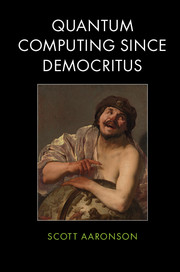Book contents
- Frontmatter
- Dedication
- Contents
- Preface
- Acknowledgments
- 1 Atoms and the void
- 2 Sets
- 3 Gödel, Turing, and friends
- 4 Minds and machines
- 5 Paleocomplexity
- 6 P, NP, and friends
- 7 Randomness
- 8 Crypto
- 9 Quantum
- 10 Quantum computing
- 11 Penrose
- 12 Decoherence and hidden variables
- 13 Proofs
- 14 How big are quantum states?
- 15 Skepticism of quantum computing
- 16 Learning
- 17 Interactive proofs, circuit lower bounds, and more
- 18 Fun with the Anthropic Principle1
- 19 Free will
- 20 Time travel
- 21 Cosmology and complexity
- 22 Ask me anything
- Index
- References
9 - Quantum
Published online by Cambridge University Press: 05 April 2013
- Frontmatter
- Dedication
- Contents
- Preface
- Acknowledgments
- 1 Atoms and the void
- 2 Sets
- 3 Gödel, Turing, and friends
- 4 Minds and machines
- 5 Paleocomplexity
- 6 P, NP, and friends
- 7 Randomness
- 8 Crypto
- 9 Quantum
- 10 Quantum computing
- 11 Penrose
- 12 Decoherence and hidden variables
- 13 Proofs
- 14 How big are quantum states?
- 15 Skepticism of quantum computing
- 16 Learning
- 17 Interactive proofs, circuit lower bounds, and more
- 18 Fun with the Anthropic Principle1
- 19 Free will
- 20 Time travel
- 21 Cosmology and complexity
- 22 Ask me anything
- Index
- References
Summary
There are two ways to teach quantum mechanics. The first way – which for most physicists today is still the only way – follows the historical order in which the ideas were discovered. So, you start with classical mechanics and electrodynamics, solving lots of grueling differential equations at every step. Then, you learn about the “blackbody paradox” and various strange experimental results, and the great crisis these things posed for physics. Next, you learn a complicated patchwork of ideas that physicists invented between 1900 and 1926 to try to make the crisis go away. Then, if you're lucky, after years of study, you finally get around to the central conceptual point: that nature is described not by probabilities (which are always nonnegative), but by numbers called amplitudes that can be positive, negative, or even complex.
Look, obviously the physicists had their reasons for teaching quantum mechanics that way, and it works great for a certain kind of student. But the “historical” approach also has disadvantages, which in the quantum information age are becoming increasingly apparent. For example, I’ve had experts in quantum field theory – people who've spent years calculating path integrals of mind-boggling complexity – ask me to explain the Bell inequality to them, or other simple conceptual things like Grover's algorithm. I felt as if Andrew Wiles had asked me to explain the Pythagorean Theorem.
- Type
- Chapter
- Information
- Quantum Computing since Democritus , pp. 109 - 131Publisher: Cambridge University PressPrint publication year: 2013
References
- 1
- Cited by



